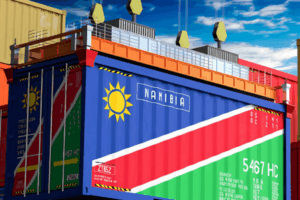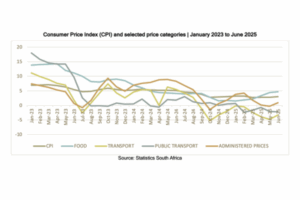There is a strong link between trade and the mobility of people on the African continent. Africa’s economic development is linked to migration and mobility. This is reflected in several key policy frameworks of the African Union (AU), including the Boosting Intra-African Trade (BIAT) and the Agenda 2063. In a recent report, ‘Assessment of the Implementation of the Goals of Agenda 2063’, the AU states that the free movement of people is a key element in boosting growth and expanding trade within Africa. Thus, the relationship between the free movement of goods and services across the continent through the African Continental Free Trade Area (AfCFTA) and the free movement of people through the AU Free Movement Protocol (AU-FMP) is critical to realising the benefits of regional integration and trade.
Labour mobility helps address gaps in the labour market. Enterprises need different skills to produce and operate. Labour mobility contributes to productivity, economic growth and welfare. The movement of people will continue. Migration is a human and natural phenomenon that contributes to household livelihoods, well-being and economic development. Global demographics will also continue to dictate how labour migration develops. Europe will continue to expand economically and need workers to support it. Sadly, many African governments are shirking their responsibilities to their citizens, contributing to desperate and dangerous journeys across the Sahara and the Mediterranean.
The mismanagement of labour migration leads to abuse, exploitation, discrimination and other violations of the rights of migrant workers. The kafala sponsorship system, unethical recruitment practices and the weak protection regimes offered by African governments to their nationals expose many migrant workers, including domestic workers living and working in the Middle East, to harsh conditions and experiences. The COVID-19 pandemic aggravated migrant labour conditions.
Moreover, if Africa is to realise its full potential, it must consciously make its integration agenda work. The AfCFTA attempts to do this. But this will only go so far unless there is a conscious and appropriate redefinition and refocusing of the concept of “our borders, territories and sovereignty”. The division of our borders during the colonial era led to the dislocation of community and family ties. Some people have relatives on the other side of the border with different nationalities and a different set of rules.
Mismanagement of labour migration leads to abuse, exploitation, discrimination and other violations of migrant workers.
A priority of the African Union’s Agenda 2063 is true, inclusive integration of the continent and its people. To achieve this, in 2018, the African Union adopted the Protocol to the Treaty Establishing the African Community on the Free Movement of Persons, Right of Residence and Right of Establishment. Unlike the AfCFTA, which has been overwhelmingly adopted and ratified, the AU Protocol on the Free Movement of Persons (AU-FMP) has been signed by more than 30 countries and ratified by only a few small countries.
The movement of business people is negotiated under Mode 4 of the services' commitment of the AfCFTA. Migration is not directly negotiated under the AfCFTA. There is a Protocol on the Movement of Persons - a separate instrument under the AU. Migration per se does not fall within the scope of the AfCFTA. The African Union Protocol on the Movement of Persons has been signed by 32 member states, but only four have ratified the Protocol (Rwanda, Niger, São Tomé and Príncipe and Mali), while 15 are needed for the Protocol to enter into force.
The AfCFTA is now in its second year. The AfCFTA agreement was adopted on 21 March 2018 and full trade under the free trade area began on 1 January 2021. 54 countries (excluding Eritrea) have signed the AfCFTA, of which 43 (80%) have deposited their instruments of ratification. The AU FMP, however, remains to enter into force and become operational as it needs to be ratified by 15 countries. The reluctance to adopt and implement the AU-FMP affects the actual and effective implementation and application of the AfCFTA. Enthusiasm and cultural integration needed to enhance stability and security are dampened. So are ideas, skills and competencies needed for invention and innovation.
The situation is worse for women involved in cross-border trade. They face challenges such as gender-based violence, harassment and exploitation, and the bottlenecks associated with free movement that undermine the activities and enterprise of cross-border traders. Cross-border traders have shown extraordinary resilience in the face of these challenges. The AfCFTA must identify and ensure appropriate safeguards to address these concerns.
Trade unions want to be involved in the ongoing negotiations on the AfCFTA and to see comprehensive labour provisions in the agreement. This is essential to ensure respect for fundamental ILO conventions, including freedom of association, and to prevent national labour laws from being revised downwards to reduce production costs to expand international trade and competition. In addition, workers must address issues that will have an impact in the future and receive responses and assurances to the concerns raised. In particular, the AfCFTA negotiation process has left little room for structured and effective participation of citizens in their various socio-economic groups.
Many parts of Africa have been experiencing positive economic growth in the past two decades, driven partly by a commodity super cycle. Increased trade, prudent macroeconomic management and sustained investment in infrastructure development also spur growth rates. Despite efforts and policies to address these issues, sustaining strong growth, especially during shocks and other vulnerabilities, and more importantly, transforming the growth spurt into a more inclusive transformation, has been a challenge for many African countries.
Research suggests a growing link between globalisation and migration (internal and international). Migration in Africa is mainly informal and undocumented, making accurate data on the phenomenon extremely scarce. Nevertheless, there is evidence of a phenomenal increase in migration across the continent. Traditional causes of migration, including conflict, political repression, economic crisis and environmental factors, have been exacerbated in recent years by globalisation. This has created new pressures that either facilitate or worsen the continent’s migration problem.
More than 80 per cent of labour migration flows involving African nationals are intra-regional, occurring within Africa. Low-skilled workers meet demand in agriculture, fishing, construction and services sectors. The majority of migrants lack adequate employment opportunities and decent working conditions. In response to these challenges for African migrant workers, several initiatives are being implemented at global, continental, regional and national levels to promote decent work, including the protection of workers’ rights within and beyond Africa. Promoting decent work for migrant workers is critical to enhancing their contribution to the economic growth and development of the countries they originate and travel to.
According to the International Organisation for Migration (IOM), the economic development of African countries and the achievement of structural transformation and industrialisation impact the creation of jobs, the protection of the livelihoods of small and medium-sized cross-border traders, and the ability of young and skilled African workers to take advantage of available employment opportunities in other African countries. The AfCFTA and Agenda 2063 hope to facilitate the mobility of categories of people, such as businessmen, entrepreneurs and investors, who are essential for cross-border investment and job creation. Greater mobility will also benefit informal cross-border traders, seasonal workers and students.
The AfCFTA may well determine what workers, their unions and their leaders will inherit in the future. Trade unionists need to understand and engage with the institutions, processes and opportunities of this continent-wide trade agreement.
It is crucial to have the relevant supporting fundamental rights and the instruments to harmonise the mutual recognition of professional qualifications and skills between the AfCFTA States Parties and the right to remuneration at the rate negotiated at the country and sectoral level. Trade unions have attempted to map the issues for labour migration and mobility and the possible responses at national, sub-regional, regional and continental levels. These efforts will form the basis of concrete arguments and narratives that trade unions can use to seek progressive and effective engagement in the governance of labour migration under the AfCFTA.
The AfCFTA may well determine what workers, their unions and their leaders inherit in the future. The next generation of trade unionists needs to understand and engage with the institutions, processes and opportunities of this continent-wide trade agreement.
You might like:
Thinking about labour provisions and the AfCFTA
* The Labour Research Service is mobilising research and supporting the learning capacity of trade unions to engage with and influence the implementation of the AfCFTA. Know more on our bilingual website on the AfCFTA for trade unions located at www.tradeunionsinafcta.org.







